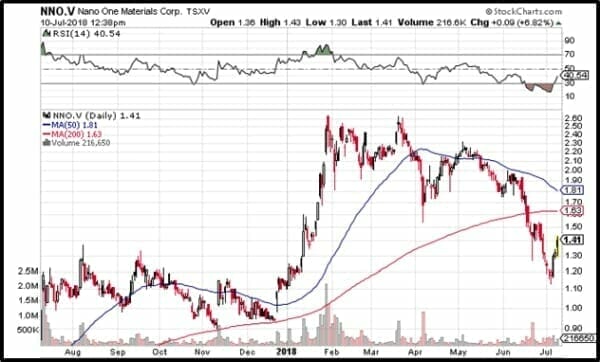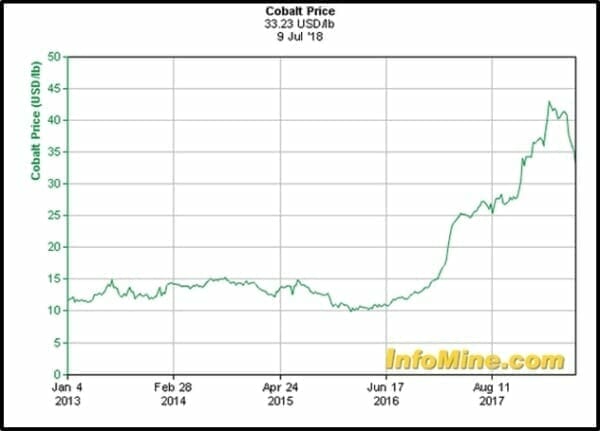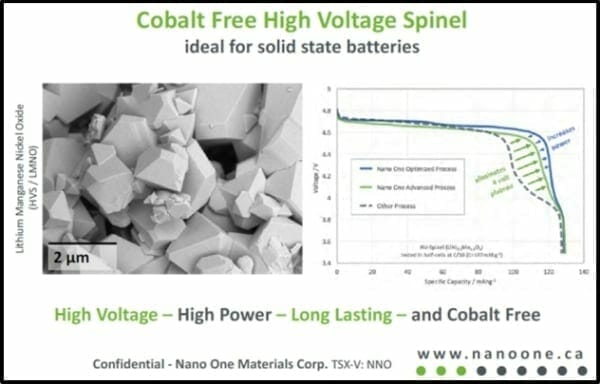Nano One (NNO.V) has developed proprietary technology to build a better and cheaper battery.
NNO’s scaled process can make cathode materials using the cheaper lithium carbonate in place of the more expensive lithium hydroxide.
We’ve been covering NNO since Benjamin Franklin took up kite flying, riding it from .31 to a March 2018 high of $2.53, and down to the current price of $1.35.
As you see from the 1-year chart above, NNO shareholders who purchased stock in early 2018, are in the red.
Legitimate question: “What the fo’ is going on with NNO share price?”
Background: we’ve written 30 articles on NNO including: locking down IP, partnering, CEO podcasts, collaborators, wealth creation, innovation, Chinese delegation, technology moats etc.
We have an almost fetishistic obsession with this battery tech company. But as we have demonstrated many times, if we think it’s time to sell, we’ll tell you.
Straight Up Answer: “There is no material evidence that explains this stunning drop in share price”.
We talked today with the President of NNO, John Lando, who confirmed that the market is impatient for NNO to announce a “more clear engagement” with the battery makers and that he “fully expects this to happen”.
Lando stressed that the “sales cycles in this industry are slow”. Building a cathode factory isn’t going to be a snap decision for any battery company.
There is another subplot which could explain part of the downward drift in share-price.
Despite little promotion, NNO was covered by several newsletter writers in Germany. Germans like green-tech stocks. That drove the price up. NNO is traded on 3 German exchanges. Recently, there has been consistent selling pressure coming out of Germany.
For instance, On July 1, 2018 (Canada Day) – when our markets were closed, 140,000 shares were sold on German exchanges.
On July 10, 2018 Nano One released a corporate update, including a “summary of cathode technology advances and opportunities with major lithium ion battery stakeholders, especially in automotive and industrial energy storage.”
In the last six months NNO has inked multiple agreements with Tier 1 Automotive Original Equipment Manufacturers (OEM)s.
Key take-aways:
Signed about 10 NDA’s
Signed 5 materials-transfer agreements
re: Demonstration Pilot Plant
Met construction milestones
Achieved optimization
Advanced 3rd party validation of cathode materials
Intensified Materials testing phase
Focused on cobalt-free high-voltage battery products
This last point is a key one, as it highlights the versatility of NNO’s technology.
There is considerable disagreement about the future of cobalt in batteries.
Some lithium-ion battery makers are building batteries without cobalt.
Other companies like Tesla and Samsung are developing low-cobalt alternatives to the traditional 1:1:1 Nickel/Manganese/Cobalt mix – moving to 8:1:1 with eight parts of nickel for each part of cobalt.
Last year Volkswagen (VLKAY.OTCPK) tried to secure a cobalt contract for 30,000 tonnes per year, but failed to do so.
The 5-year cobalt spot price trend confirms that there is a business case to use non-cobalt materials.
NNO can build cobalt-free batteries.
It can build almost any kind of battery you want.
That flexibility is power.
“Nano One commissioned a demonstration pilot plant to prove its process at scale, enable larger volumes of materials for 3rd party material testing, and provide an engineering platform for further optimization,” stated NNO update, “Since that time, various cathode materials have been successfully made and validated at the pilot scale including NMC (lithium nickel manganese cobalt oxide), HVS (lithium manganese nickel oxide or high voltage spinel) and LFP (lithium iron phosphate).”
Forward-looking, NNO is conducting a preliminary full-scale engineering design for commercial deployment, “enabling Nano One to engage with strategic supply chain interests.”
The resulting engineering design package describes a modular unit capable of 3,300 tonnes per year, representing cathode material for approximately 24,000 60kWh electric vehicles batteries.
NNO’s patent portfolio has grown from 3 to 9, adding Japan, Korea and Canada to its other patents in the US and Taiwan. NNO has 30 new patent applications that will extend the company’s global IP portfolio across more than a dozen patent families.
Employing a bakery analogy: NNO doesn’t have a patent on cinnamon buns – it has a patent on cheaper, easier-to-cook flour.
When NNO’s products achieve commercialisation, NNO anticipates receiving a royalty from every bakery-item cooked with that flour.
According to Wise Guy Reports, the 2017 worldwide lithium-ion cathode market was about $5.1 billion – and is expected to reach $58.8 billion by 2024.
By mid-morning NNO is up 6% to $1.38. The Germans are lining up on the buy-side.
We believe NNO is a “value pick” at this price.
Not convinced?
Take a tour of the NNO factory with CEO Dan Blondal
Full Disclosure: NNO is an Equity Guru marketing client, we own stock and wouldn’t dream of selling it now.




